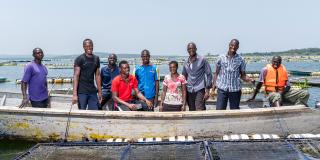
There has been much talk across the international development sector in the past two years about the need to “decolonise” aid, to transfer power to those in the countries where international non-governmental organisations (INGOs) are operating.
As VSO’s Director of Global Programmes based in South Africa, this is a debate I am keenly interested in. There’s no question of the moral imperative to take steps towards a world in which the global south takes its rightful place in the development system. But as the recent research by the University of Oxford and INGOs has shown, it is far less clear how it is put into practice. At VSO, we have responded in both our internal practice as well as in our development programming.
Who we are
VSO in 2022 is a very different organisation to the one first established at the kitchen table of Alec and Moira Dickson in the UK in 1958 as they responded to a request from the Bishop of Portsmouth for volunteers to support Borneo.
Under our Volunteering for Development approach, the vast majority of our volunteers are now community and national volunteers, supported by VSO to take action in their own countries and communities, whether that is through helping people to become more resilient against the impacts of climate change, or raising awareness about their rights to health or education.
Collaborating with international volunteers who bring a different set of technical expertise and perspective, these blended teams are able to imagine and act upon innovative, sustainable solutions to the problems faced by communities.
Active participation, not passive beneficiaries
For some years now, we have refused to use the word “beneficiaries”, rather deliberately using the term “primary actors” – “primary” because they are principal contributors to VSO’s mission, and “actors” because they are active participants in creating the change they desire.
We are changing our mindset – shifting our accountability to these primary actors through a rigorous monitoring and evaluation approach called MILE (Measuring Impact for Learning and Empowerment). All our interventions start with collaborating with primary actors to understand their needs and ambitions, and then continuing their involvement thorough every stage of implementation through to evaluating the impact of our programmes.
We are committed to “localisation”, not as the transfer of resources and decision-making to VSO-branded entities in our countries of operation, but to the national institutions and civil society organisations we partner with in our work. We are challenging ourselves to understand our value as a truly global partner, rather than diminishing the resource base available to local actors.
Breaking down traditional leadership
We know that change begins within. For a long time, the leadership in our programming countries has reflected the diversity of our global presence. But we have been moving the needle on our leadership even further.
VSO’s strategic leadership team is a core group of people responsible for shaping the future of the organisation; most of those leaders now come from, and are based in the global south. For example, our leadership and evaluation work is led from India, our education and health work from Cambodia and our implementation quality assurance from South Africa.
All our global teams are dispersed globally and there is no “HQ”. We navigate time zones, cultural differences and requirements of our partners over Microsoft Teams, Zoom and WhatsApp. To ensure fairness, all staff are on national terms and conditions wherever they work.
Dismantling power structures
We make sure all staff and volunteers reflect upon their own power and preconceptions through our mandatory social inclusion and gender training, which has a strong element of action planning. We have a globally diverse leadership team and international board of trustees.
We know we must guard against complacency. A recent report from the International Development Committee in the UK parliament highlighted how, in common with society as a whole, structural racism continues to be present in the development sector. We need to continually challenge our own inherent prejudices and assumptions and to constantly review our culture and our systems to make sure we live up to our values of inclusion and integrity.
We have a responsibility to address the power structures which often perpetuate the very inequalities we are meant to be addressing. To create real, transformative change requires all people within the system to have a voice. We must, in the words of development practitioner Robert Chambers be prepared to “hand over” the stick of power to our primary actors.
Read about our strategic ambition and priorities in our updated strategy
Read more

Transforming lives through education: Geoffrey’s VSO legacy
With a deep belief in the transformative power of education, Geoffrey from Norfolk, UK, has devoted his life both in the UK and abroad to making education more accessible for all.

A ripple of change: how VSO volunteers are transforming communities
Every act of volunteering begins with a choice — a decision to act out of a desire to make a difference. Across the world, VSO volunteers are proving that one spark of action can ignite something much bigger.
